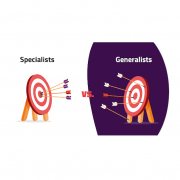Generalists or specialists: does narrow specialization pay off?
The Polish Software Development Association (SoDA) asked me for my opinion whether narrow specialization pays off. As the owner and CEO of a software house specialized in the financial sector, I am a supporter of field specialization. Complex projects connected with specific and complicated disciplines such as finance require a high entry threshold. There is no room for general-interest companies.
Generalist or specialist?
As a CEO, you can decide to either choose a field and deliver very complex projects, or to solve a lot of problems, in many areas, but rather superficially. I believe that the market needs both types of providers. However, specialization allows solving problems of a larger calibre and allows building long-term business relationships. Your partner is aware that this is long-standing cooperation and that you will be able to help them solve the problem now, next year, as well as in two years’ time.
Specialization is also a natural way to create your own products and services. The more you delve into a specific topic, the more you start to see things that could be improved, and the byproduct is a specific product. This is how Payres, our proprietary system for activating banking data in real-time, was created.
Instead of a domain specialization, some companies choose a technological one. For example, the Polish software house STX Next specializes in Python. They consistently build the brand of the largest European Python development company. This label certainly gives them a unique differentiator and distinguishes them in the eyes of both clients and job candidates. Such a strategy can ensure relatively quick niche domination and therefore, global significance in terms of specific solutions.
Pros and cons of specialization
Specialization also has its drawbacks, including recruiting appropriate staff and the possible industry crisis. It requires an extended career path. These days, young people want to be Renaissance men, hence it is more difficult to find people willing to carry out this type of strategy. That is why I am an avid supporter of the T-shaped approach: focusing on a specific domain, with an in-depth understanding of the related topics, complemented by the possibility of using specialists in other fields.
Today, software houses are a bit like film studios. We regularly provide a product, i.e. software, for various projects, based on the joint effort of high-class specialists. This model is spreading to other industries as well. For example, in the construction industry, you will find more and more developers operating as generalists, employing designers or architectural studios that specialize in arranging private or office interiors.
Brand specialization “made in Poland”
The question about the legitimacy of specialization was posed by an association of the programming sector representatives. SoDA already has over 100 members, and their number is growing dynamically, which draws attention to the Polish specialization. There is a chance that a state-of-the-art, well-thought-out code will become a Polish export product.
Poland has already been dubbed “the IT hub of Europe”. In the first quarter of 2018, there were a total of 1,236 BPO, SSC, IT and R&D centres (Polish and international) in Poland, employing a total of 279,000 people. Polish developers are among the best programmers in the world. We have created not only a product brand but also a unique work culture, in which our national determination, persistence and inclination to solve difficult problems has found an outlet.
We need initiatives that broadcast the reputation of Polish developers in the day-to-day “job well done” for foreign clients. In the times of a global pandemic, specialization is worth considering, to prioritize and determine further paths of development in the “new normal”.

